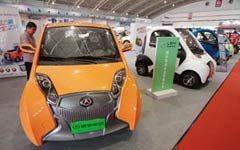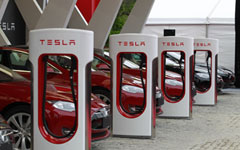China is increasing the number of new-energy vehicles in government and public institutions' fleets in order to boost their widespread use.
These cars should account for at least 10 percent of all newly purchased ones in 2014, 20 percent in 2015 and 30 percent in 2016, according to a plan the National Government Offices Administration published on its website on Sunday.

|
 |
New-energy vehicles include fully electric cars, plug-in hybrids and those powered by fuel cells.
The plan says that charging stations' low numbers are frequently mentioned as the reason for low public enthusiasm for new-energy vehicles. It says that the number of charging slots should not be less than the number of new-energy vehicles. It also stipulates that any newly built government or public institution parking lot should be equipped with charging facilities for new-energy vehicles.
To achieve that goal, private capital has been invited to play a larger role in beefing up China's charging network.
The plan is the latest effort to boost such vehicles' popularity after the State Council decided to exempt them from the purchase tax, which currently stands at 10 percent, from Sept 1 to the end of 2017.
The wave of favorable policies is intended to boost sales, said John Zeng, an analyst at Shanghai-based consulting firm LMC Automotive, but he worried that protectionism might be involved in government purchases of new-energy vehicles.
"The market is still very small, and if local governments protect local brands, the market will become even further fragmented," he said.
